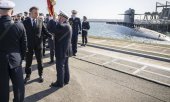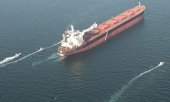European states have different stances on the US and Israeli attacks on Iran. German Chancellor Friedrich Merz stressed at a meeting with US President Donald Trump on Tuesday that Germany agrees that the regime in Tehran must be removed from power. The UK initially refused to allow the US to use British military bases for attacks on Iran but has now given permission in specific cases. Meanwhile Spanish Prime Minister Pedro Sánchez has spoken out against the strikes and called them a violation of international law.
The conflict in the Middle East is pushing up oil and gas prices. Threats from Iran have paralysed maritime traffic through the Strait of Hormuz, with tankers piling up on both sides. After deliveries from Qatar were suspended the price of liquefied natural gas (LNG) on the Amsterdam stock exchange jumped from below 32 euros on Friday to more than 62 euros per megawatt hour on Tuesday. Europe's press looks at the short-, medium- and long-term consequences.
France will focus on increasing its nuclear arsenal and use it to enhance Europe's collective security, President Emmanuel Macron stated in his speech on the update to the country's nuclear doctrine. He also mentioned the possibility of relocating French nuclear weapons to other European countries. Shortly after the speech, France and Germany issued a joint statement establishing a "steering group" for closer cooperation on deterrence.
The war in the Middle East also has implications for Russia: on the one hand Tehran is a Kremlin ally and supplied Russia with drone technology in particular at the beginning of the war in Ukraine. On the other hand the looming shortages of oil and gas on the global market give Russia an opportunity to increase its earnings on energy exports, which have been restricted by sanctions. The media weigh up the pros and cons.
The US and Israel began attacking targets in Iran on Saturday morning, killing the Supreme Leader Ayatollah Ali Khamenei. US President Donald Trump justified the strikes by saying that Iran posed an immediate threat to the US and its allies in the region. Tehran had responded with missile and drone strikes against Israel and several Gulf states where US military bases are located. Europe's press fears the situation could escalate.
In addition to Ali Khamenei, other leading regime figures have been killed in the airstrikes on Iran. At the end of his video message, US President Donald Trump addressed the Iranian people and outlined the future of the country as follows: "Bombs will be dropping everywhere. When we are finished, take over your government. It will be yours to take." The European press paints a more complex picture.
The citizens' initiative "My voice, My Choice" has collected 1.1 million signatures for safe abortions in the EU and submitted it to the European Commission. The Commission ruled that EU states can use existing funding from other programmes to pay for abortions but stopped short of setting up a new fund to cover treatment and travel costs. A victory?
On a multi-day visit to Germany's most important trading partner, China, Chancellor Friedrich Merz declared his intention to deepen both diplomatic and economic relations. After a meeting with President Xi Jinping, Merz and Prime Minister Li Qiang signed several agreements on issues such as climate change and the fight against animal diseases with a view to closer collaboration.
Against the backdrop of a massive US military build-up, indirect talks between the US and Iran resumed in Geneva on Thursday. While the main topic was Iran's nuclear programme, the US is also seeking a deal on missile armament. There was no breakthrough but further talks are scheduled to take place in Vienna next week. The media examine the motives on both sides.
Danish voters will elect a new parliament on 24 March after the country's Social Democratic Prime Minister Mette Frederiksen announced a snap election yesterday. The vote would have had to take place no later than 31 October anyway, but the announcement comes as no surprise as Fredriksen's popularity has soared since the Greenland crisis. Whether she can and wants to continue with the current three-party coalition remains to be seen.
On Monday, the 45th anniversary of the attempted coup of 23 February 1981, the Spanish government announced that it was declassifying the corresponding documents, which since are available for viewing on the government website. The failure of the military coup was a key moment in Spain's transition to democracy, known as the "Transición", after the death of dictator Francisco Franco in 1975.
In the wiretapping scandal that shook Greece in 2022, a court has sentenced four businessmen associated with spyware manufacturer Intellexa to prison on Thursday. The Predator spyware was used for illegal wiretapping operations against politicians, journalists, military personnel and entrepreneurs. The national press is now pushing for further clarification of the case.












